Persecution of Muslims in Crimea: "They conducted Friday prayers at gunpoint".
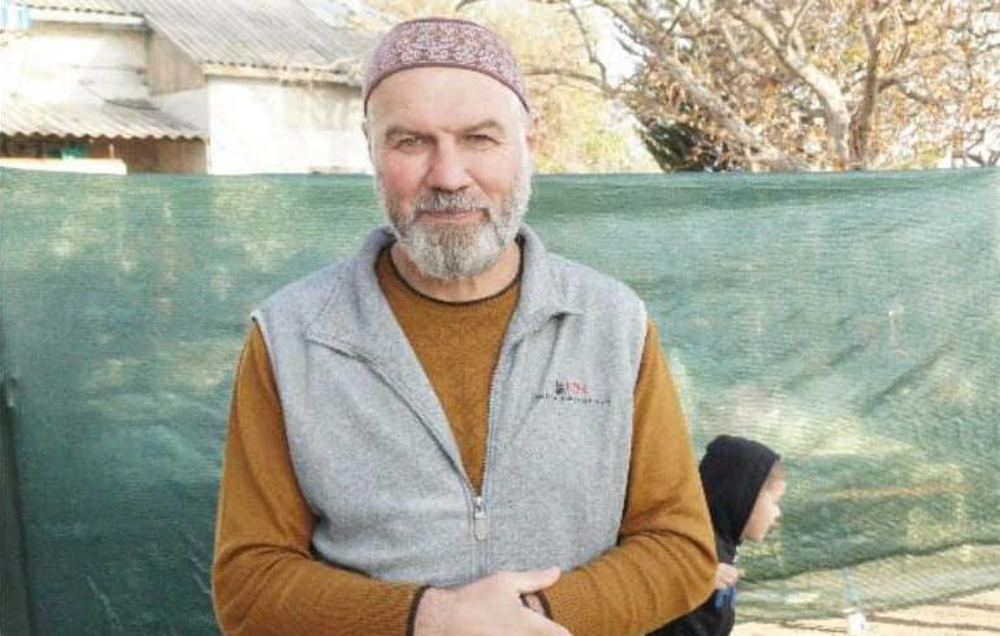
The Russian Police's Centre for Countering Extremism raided Alushta's independent Yukhary-Jami mosque on 23 November, as well as the homes of the Imam, Yusuf Ashirov, and two leaders. A court jailed the three men for several days. While the Imam was jailed, Centre for Countering Extremism officers came to Friday prayers to support an Imam from the Crimean Muslim Board (to which the mosque does not belong). Lieutenant Colonel Ruslan Shambazov told the head of the mosque community to get the community to accept the new Board-imposed Imam.
On 23 November, armed and masked officials of the Russian Police's Centre for Countering Extremism raided the independent Yukhary-Jami mosque in the southern Crimean town of Alushta, seizing Islamic books. Early that morning they also raided the homes of the imam, Yusuf Ashirov, and two mosque community leaders. Judge Denis Kireyev of Alushta Town Court then jailed the three men for between two and five days.
On Friday 24 November – while Imam Ashirov was in prison - officials of the Centre for Countering Extremism came to Yukhary-Jami mosque to support an Imam appointed by the Crimean Muslim Board (to which the mosque does not belong). "They conducted Friday prayers at gunpoint, threatening that if any of the people stood up and began to give the hutba [sermon], they would simply take him away from there," lawyer Rustem Kyamilev told human rights group Crimean Solidarity.
On 29 November, a judge sent back a separate case against Imam Ashirov of conducting "missionary activity". It remains unclear if and when the case will be presented to court again.
Early on 30 November, about six masked officers raided the home of Abdul Gafarov, the chair of Yukhary-Jami mosque community. Only one of the officers identified himself, Lieutenant Colonel Ruslan Shambazov, head of the Police's Centre for Countering Extremism in Crimea, his wife Fatima Gafarova told Crimean Solidarity.
Lieutenant Colonel Shambazov told Gafarov that as head of the mosque community, he had to get the community to accept the new Imam imposed by the Crimean Muslim Board and keep the community calm.
Police drew up a record of an offence against the mosque community for alleged "extremist" books which officials say they found during the 23 November search of the mosque. Alushta Town Court is due to hear the case on 19 December.
Forum 18 was unable to find out from Lieutenant Colonel Shambazov why he sees it as his role to interfere in the affiliation of a religious community and who it chooses as its leader. Officials of the Centre for Countering Extremism in the Crimean capital Simferopol did not answer the phone each time Forum 18 called.
The duty officer at Alushta Police – who did not give his name – refused to answer any questions about the police action against mosque members. "We don't have the right to give any information by phone," he told Forum 18. He refused to put Forum 18 through to the Head of Alushta Police, Colonel Anton Smolin, or any other officer who could explain why officers raided Yukhary-Jami mosque and the homes of its imam and leaders.
Human rights defender Lutfiye Zudiyeva believes the moves against Alushta's Yukhary-Jami mosque community are part of a wider plan to subjugate all Muslim activity in Crimea to the Crimean Muslim Board, which has worked with the Russian occupation authorities.
"For many years, the community has been experiencing systematic attacks aimed at ensuring that the Yukhary-Jami mosque came under the full control of the Crimean Muslim Board and the [Russian] special services - contrary to the wishes of the mosque members," Zudiyeva told Crimean Solidarity. "A religious monopoly on the peninsula is established through such arrests and pressure, but this can hardly be called winning hearts".
Imam Ashirov and the mosque community have lodged cases to the European Court of Human Rights (ECtHR) in Strasbourg. "The applicants in these two applications allege ongoing violations in respect of independent Islamic organisations on the territory of Crimea and an official tolerance on the part of the Russian authorities," the ECtHR notes. "In particular, they allege that in 2019 the Muslim Community 'Alushta' was deprived of its right to use the Mosque in Alushta, Crimea, which was subsequently transferred to the Religious Board of the Muslims of Crimea".
Russia's March 2014 annexation of Crimea is not recognised by Ukraine or internationally. The Russian authorities in Crimea use the wide range of available laws and regulations to punish communities that meet for worship in ways and places the authorities do not like.
Years of Russian pressure
The Russian state has backed attempts by the Crimean Muslim Board to take control of the independent Yukhary-Jami mosque in the southern Crimean town of Alushta. The independent mosque community gained state registration under Ukrainian law in April 1993, according to Russian tax records.
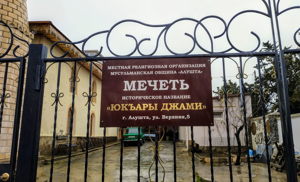
The Community has worshipped in the 19th century mosque since 1994, twenty years before Russia's illegal invasion and annexation of Crimea. Yusuf Ashirov chaired the community from 2001, and then became Imam in 2014.
However, after the Russian occupation of Crimea in 2014, a September 2018 Crimean Council of Ministers decision handed control of Yukhary-Jami mosque to Crimea's State Committee for Inter-ethnic Relations and Deported Citizens. The community challenged the decision in court, pointing to decisions in 1994 and 1996 which handed the historical mosque to the community. However, the community lost its court challenges in 2019 and 2020.
In early 2021, both Imam Ashirov and the mosque community lodged cases against Russia over the seizure of control over their building to the European Court of Human Rights in Strasbourg.
The community continued to worship in the mosque. Prosecutors in Alushta brought a case against Imam Ashirov in April 2020. Alushta Magistrate's Court No. 22 fined him in June 2020 under Russian Administrative Code Article 5.26, Part 4 ("Russians conducting missionary activity").
Imam Ashirov was among at least 10 of the 13 individuals fined under Russia's "anti-missionary" laws in 2020 in Russian-occupied Crimea for leading meetings for worship in mosques outside the framework of the Russian-backed Crimean Muslim Board. Many of the fines followed raids on mosques during meetings for worship – and in at least one case the use of secretly-recorded footage inside a mosque. All 13 individuals were each fined about 5 days' average local wages.
During a raid on the Yukhary-Jami mosque in April 2021, officials found Imam Ashirov leading Friday prayers without permission from the Russian state-backed Crimean Muslim Board. In June 2021, Alushta Magistrate's Court No. 22 again fined him 5,000 Russian Roubles under Russian Administrative Code Article 5.26, Part 4 ("Russians conducting missionary activity").
Mosque's electricity and gas supply cut
Electricity to the Yukhary-Jami mosque has been cut off since 2019. The company told community members there had been an "order" from above, local Muslims told Forum 18. The only electricity the mosque has access to is via a line supplied by a non-Muslim neighbour.
In autumn 2023, the Krymenergo company cut off gas supplies to the mosque, local Muslims told Forum 18. Company officials claimed it could not supply gas as the community does not have documents for the land or building. The company then accepted payment for the outstanding bill and reconnected the supply, when the mosque community promised it would present documentation.
Armed men raid mosque members' homes
Between 6 and 7 am on 23 November 2023, armed and masked men of the Russian Police's Centre for Countering Extremism raided the homes in the villages of Verkhnyaya Kutuzovka and Izobilnoe of three leading members of Alushta's Yukhary-Jami mosque. Officers raided the homes of the mosque's imam, Yusuf Ashirov, as well as of Vilen Useinov and Zinur Appazov, human rights group Crimean Solidarity noted the same day.
The raiders entered the homes with muddy footwear and demanded that those present – including children – get up and get dressed. They searched the homes, seizing telephones and written material, including several books. They refused to identify themselves.
Officers asked Useinov if he attended Yukhary-Jami mosque. He told them that he had no preference for which mosque he prayed in, going to whichever was most convenient.
The Centre for Countering Extremism officers then took the three men to Alushta Police.
The same day, officers also searched Yukhary-Jami mosque in Alushta, where they claim to have seized books.
Officials of the Centre for Countering Extremism in the Crimean capital Simferopol did not answer the phone each time Forum 18 called on 6 December.
"Missionary activity" charge against Imam
At about 11 am on 23 November at the police station, in a room with other police officers and the two official "witnesses", an officer drew up a record of an offence against Imam Ashirov under Russian Administrative Code Article 5.26, Part 4 ("Russians conducting missionary activity"). Imam Ashirov refused to write a statement. The officer claimed that the Imam had "jumped up from his chair", shouted, gesticulated and sworn at him.
The officer then drew up a separate record of an offence against Imam Ashirov under Russian Administrative Code Article Code Article 20.1, Part 1 ("Petty hooliganism").
"When drawing up the record of an offence, one of the police officers said that they wanted to visit the mosque tomorrow and that Yusuf Ashirov would speak out in support of the Muslim Board and said that now another person would conduct Friday prayers there. The imam refused to do this, for which a report was drawn up against him for petty hooliganism," lawyer Rustem Kyamilev told Crimean Solidarity.
The duty officer at Alushta Police – who did not give his name – refused to answer any questions about the police action against mosque members. "We don't have the right to give any information by phone," he told Forum 18 on 6 December. He refused to put Forum 18 through to the Head of Alushta Police, Colonel Anton Smolin, or any other officer who could explain why officers raided Yukhary-Jami mosque and the homes of its imam and leaders.
Imam jailed
In the afternoon of 23 November, police took Imam Ashirov to Alushta Town Court to face charges under Russian Administrative Code Article Code Article 20.1, Part 1 ("Petty hooliganism"). The case was handed to Judge Denis Kireyev just before 2:30 pm. Within two hours, the judge had heard the case, found the Imam guilty and sentenced him to two days' jail, according to court records.
In court, Imam Ashirov admitted he had "spoken emotionally" to the police officer but denied he had sworn at him. The Judge rejected his testimony.
Officials took Imam Ashirov from the court to serve his sentence at the holding centre at Police Station No. 1 in Simferopol's Railway District. Officials released him on 25 November, Crimean Solidarity noted the same day.
More than 200 Muslims from Alushta signed a statement in support of Imam Ashirov.
Two other mosque members jailed
In separate hearings on 23 November, the same Judge Kireyev of Alushta Town Court found two other members of the town's independent Yukhary-Jami mosque guilty under Russian Administrative Code Article 20.3, Part 1 ("Propaganda of Nazi symbolism or symbolism of an extremist organisation"). Both cases reached the court just before 1 pm, and both had been sentenced and handed written decisions within three hours.
Judge Kireyev found Vilen Useinov guilty for posting on a page on the VKontakte social network in 2013 the image of a white flag bearing the Islamic profession of faith. The Prosecutor claimed it was the flag of organisations declared "terrorist" in Russia. Useinov told the court that he did not know that in 2003, Russia's Supreme Court had declared 15 Islamic-inspired organisations "terrorist". The Judge jailed him for ten days, according to the decision seen by Forum 18.
Judge Kireyev found Zinur Appazov guilty for posting on his page on VKontakte in 2016 a video of a man in front of the Congress of the Peoples of Ichkeria and Dagestan. This was among the 15 organisations Russia's Supreme Court declared "terrorist" in 2003. Appazov told the court he had not posted the video on his page and did not know it was there. He promised to delete it. The Judge jailed him for five days, according to the decision seen by Forum 18.
"They conducted Friday prayers at gunpoint"
On Friday 24 November – while Imam Ashirov was in prison - officials of the Centre for Countering Extremism came to Alushta's Yukhary-Jami mosque. They remained outside the mosque, but said they would come in if the community did not accept the situation. Prayers were led by a Crimean Muslim Board Imam who came from Simferopol. Mosque members asked the visiting Imam why their own Imam had been arrested.
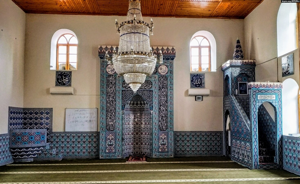
"They conducted Friday prayers at gunpoint, threatening that if any of the people stood up and began to give the hutba [sermon], they would simply take him away from there," lawyer Rustem Kyamilev told Crimean Solidarity on 25 November.
"Thus the hutba was given there not from the local religious community, but by an imam sent by the mufti," Kyamilev added. He was referring to Mufti Emirali Ablayev, head of the Russian-backed Crimean Muslim Board (to which the Yukhary-Jami mosque community does not belong).
Similarly, police attended outside the mosque for Friday prayers on 1 December. The Crimean Muslim Board Imam again came from Simferopol to lead the prayers and preach. "We are not happy, but we have no choice," a local Muslim told Forum 18. "We don't blame this Imam."
A mosque community member explained what they saw as the Russians' aim. "They want our community to be different [from how it currently is]," the community member told Forum 18. "We're independent, but they want us not to be. They say the Crimean Muslim Board should be in control."
Home of mosque chair raided, new administrative case
At about 6:30 am on 30 November, about six masked officers raided the home in the village of Verkhnyaya Kutuzovka of Abdul Gafarov, the chair of Alushta's Yukhary-Jami mosque community. Only one of the officers identified himself, Lieutenant Colonel Ruslan Shambazov, head of the Centre for Countering Extremism in Crimea, his wife Fatima Gafarova told Crimean Solidarity the same day.
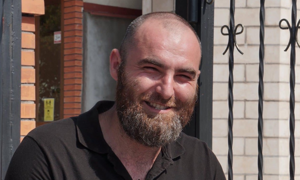
The officers searched the house (taking the original registration documents) before taking Gafarov to Alushta Police. An official of the Centre for Countering Extremism then drew up a record of an offence under Russian Administrative Code Article 20.29 ("Production or mass distribution of extremist materials included in the published Federal List of Extremist Materials, as well as their production or storage for mass distribution").
"They confiscated Islamic books in the Yukhary-Jami mosque on the day when Yusuf Ashirov's home was searched [23 November]," Gafarov told Crimean Solidarity on 30 November. "And now they've draw up a record of an offence for the distribution of extremist literature against the legal entity, that is, against me as the chair of this community."
Gafarov refused to sign the record of an offence as he objected to it. Officers then refused to give him a copy. They released him at about 10 am.
On 1 December, the case – against the mosque community, not specifically against Gafarov – was handed to Alushta Town Court. It was assigned to Judge Tatyana Zakharova, who is due to hear the case on the morning of 19 December, according to court records.
Lieutenant Colonel Shambazov told Gafarov that as head of the mosque community, he had to get the community to accept the new Imam and keep the community calm.
Forum 18 was unable to find out from Lieutenant Colonel Shambazov why he sees it as his role to interfere in the affiliation of a religious community and who it chooses as its leader. Officials of the Centre for Countering Extremism in Simferopol did not answer the phone each time Forum 18 called on 6 December.
Imam to face "missionary activity" charge in court
Imam Ashirov also faces administrative prosecution under Russian Administrative Code Article 5.26, Part 4 ("Russians conducting missionary activity"). This incurs a fine of 5,000 to 50,000 Roubles. For organisations (legal entities), the fine is 100,000 to 1 million Roubles. Russia's Administrative Code specifies that cases under Article 5.26 can be brought by the police, Prosecutor's Offices, or local Justice Departments.
The case against Imam Ashirov was handed to Alushta Magistrate's Court No. 22 on 29 November. The same day, Judge Yana Bykova returned the case for further work, according to court records.
The official who answered the phone at Alushta Magistrate's Court No. 22 on 6 December refused to discuss with Forum 18 the case against Imam Ashirov or explain why the case was sent back.
Russia imposing Muslim Board monopoly?
Human rights defender Lutfiye Zudiyeva believes the moves against Alushta's Yukhary-Jami mosque community are part of a wider plan to subjugate all Muslim activity in Crimea to the Crimean Muslim Board, which has worked with the Russian occupation authorities. She says it is obvious that it is not only the Crimean police and the Centre for Countering Extremism that are behind moves against the mosque community.
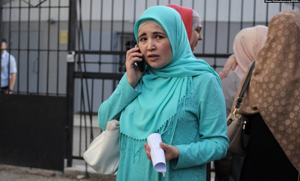
"For many years, the community has been experiencing systematic attacks aimed at ensuring that the Yukhary-Jami mosque came under the full control of the Crimean Muslim Board and the [Russian] special services - contrary to the wishes of the mosque members," Zudiyeva told Crimean Solidarity. "A religious monopoly on the peninsula is established through such arrests and pressure, but this can hardly be called winning hearts."
Zudiyeva noted that Imam Ashirov has been conducting religious ceremonies in Alushta for many years. "His formal removal from the post of imam through joint contractual schemes with the special services will not change people's trust in him, and certainly will not increase respect for the new protégé," she insisted. "In general, it is very strange to see security forces acting as a regulator within one Muslim community of Crimea."
The Russian occupation authorities have obstructed other Muslim communities which do not belong to the Crimean Muslim Board.
"Observations" in the "expert conclusion" by Russia's Justice Ministry Expert Council in Moscow on the Tavrida Muftiate – founded in 2014 and the smaller of the two Crimean Muftiates – blocked its re-registration. Of the 15 Crimean religious communities which underwent "expert analyses" in 2015, the Tavrida Muftiate was the only one which failed to gain re-registration after receiving an "expert conclusion". The Crimean Justice Ministry registered 10 of its mosque communities independently, but refused to register the Tavrida Muftiate as a centralised religious organisation.
Yelena Shadrina of the Registration Department for Non- Commercial Organisations at Crimea's Justice Ministry in Simferopol told Forum 18 in December 2019 that the Tavrida Muftiate "committed violations in their documents and the reasons for the rejection are given in the letters".
On 7 January 2023, the Russian authorities blocked access in Russia and occupied Crimea to the Ukrainian Islamic website Islam.in.ua, which was set up in Kyiv by the Congress of Muslims of Ukraine.
Two mosque cases at European Court of Human Rights
In February 2021, Imam Ashirov lodged a case against Russia to the European Court of Human Rights (ECtHR) in Strasbourg (Application No. 11890/21). In March 2021, the Alushta mosque community lodged a case against Russia to the ECtHR (Application No. 17009/21). Sergei Zayets of the Regional Centre for Human Rights in Kyiv represents the applicants.
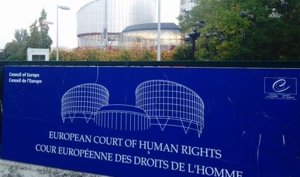
"The applicants in these two applications allege ongoing violations in respect of independent Islamic organisations on the territory of Crimea and an official tolerance on the part of the Russian authorities," the ECtHR notes. "In particular, they allege that in 2019 the Muslim Community 'Alushta' was deprived of its right to use the Mosque in Alushta, Crimea, which was subsequently transferred to the Religious Board of the Muslims of Crimea."
The Court asked the Russian authorities about both cases on 28 October 2022.
Author: Felix Corley
Source: Forum 18